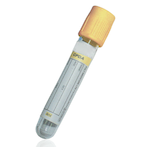Sex-Hormone Binding Globulin (SHBG)
Specimen Volume
0.5 mL bloodSample Preparation
Centrifuge
Turnaround Time
24 hoursSample Processing In Laboratory
Usual
Sample Stability
4 ºC
General Information
Sex hormone-binding globulin (SHBG) is a glycoprotein synthesized by the liver. Circulating androgen and eostrogen concentrations influence SHBG synthesis. The regulation of SHBG synthesis, combined with SHBG's higher affinity for testosterone, impacts bioavailable testosterone concentrations.
SHBG binds up to 98 percent of the steroid hormones in the blood including 5a-dihydrotestosterone (DHT), testosterone and androstenediol with particularly high affinity, and estradiol and estrone with slightly lower affinity. It is clinically important to understand that increased androgenic activity can occur with testosterone concentrations inside conventional population reference intervals when SHBG concentrations are low. This is a result of an increase of the free androgen because of the reduced concentrations of SHBG with consequent reduction in the of available steroid binding capacity.
Male and female children have similar SHBG concentrations until the onset of puberty, when SHBG concentrations begin decreasing more rapidly in males than in females. Concentrations are higher in women than in men, due to the higher ratio of estrogens to androgens in women. Concentrations are especially elevated during late pregnancy and in women taking oral contraceptives.
Decreasd SHBG concentrations are associated with a variety of conditions. These include hypothyroidism, polycystic ovarian syndrome (PCOS), obesity, acromegally, hirsutism, alopecia and hyperandrogenic states. Elevated concentrations are associated with hyperthyroidism, and liver cirrhosis.
Patient Preparation
None
Reference Range
Adult females: 19.8 - 155.2 nmol/L
Adult males: 13.5 - 71.4nmol/L
Source of Reference Range
Abbott DiagnosticsSpecifications
- EQA Status: NEQAS
- EQAS Scheme: Yes








